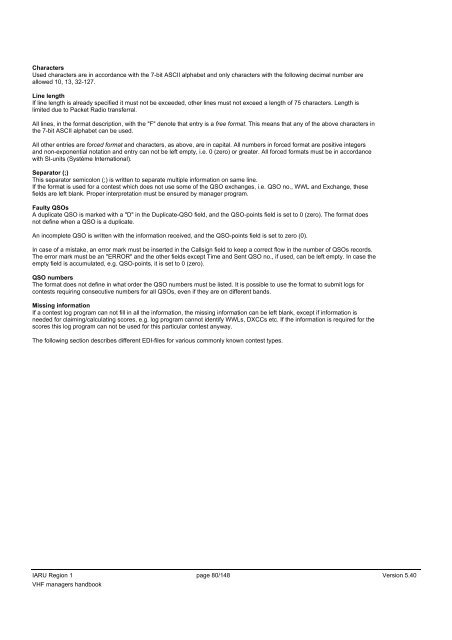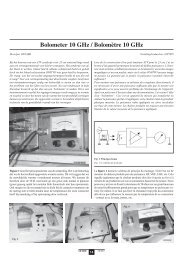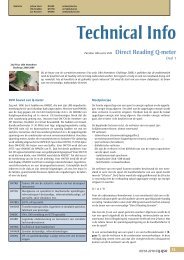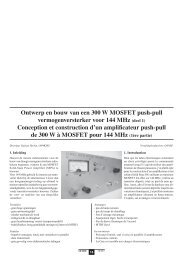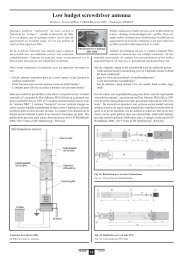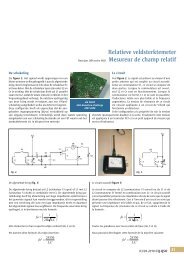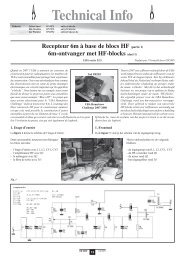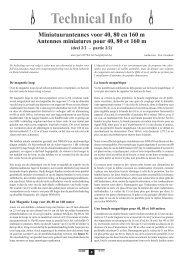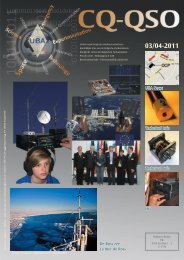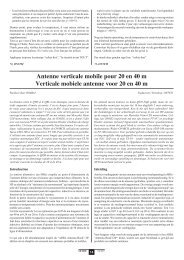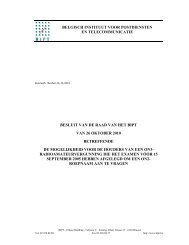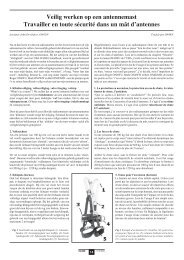IARU Region 1 VHF Managers Handbook - UBA
IARU Region 1 VHF Managers Handbook - UBA
IARU Region 1 VHF Managers Handbook - UBA
You also want an ePaper? Increase the reach of your titles
YUMPU automatically turns print PDFs into web optimized ePapers that Google loves.
Characters<br />
Used characters are in accordance with the 7-bit ASCII alphabet and only characters with the following decimal number are<br />
allowed 10, 13, 32-127.<br />
Line length<br />
If line length is already specified it must not be exceeded, other lines must not exceed a length of 75 characters. Length is<br />
limited due to Packet Radio transferral.<br />
All lines, in the format description, with the "F" denote that entry is a free format. This means that any of the above characters in<br />
the 7-bit ASCII alphabet can be used.<br />
All other entries are forced format and characters, as above, are in capital. All numbers in forced format are positive integers<br />
and non-exponential notation and entry can not be left empty, i.e. 0 (zero) or greater. All forced formats must be in accordance<br />
with SI-units (Système International).<br />
Separator (;)<br />
This separator semicolon (;) is written to separate multiple information on same line.<br />
If the format is used for a contest which does not use some of the QSO exchanges, i.e. QSO no., WWL and Exchange, these<br />
fields are left blank. Proper interpretation must be ensured by manager program.<br />
Faulty QSOs<br />
A duplicate QSO is marked with a "D" in the Duplicate-QSO field, and the QSO-points field is set to 0 (zero). The format does<br />
not define when a QSO is a duplicate.<br />
An incomplete QSO is written with the information received, and the QSO-points field is set to zero (0).<br />
In case of a mistake, an error mark must be inserted in the Callsign field to keep a correct flow in the number of QSOs records.<br />
The error mark must be an "ERROR" and the other fields except Time and Sent QSO no., if used, can be left empty. In case the<br />
empty field is accumulated, e.g. QSO-points, it is set to 0 (zero).<br />
QSO numbers<br />
The format does not define in what order the QSO numbers must be listed. It is possible to use the format to submit logs for<br />
contests requiring consecutive numbers for all QSOs, even if they are on different bands.<br />
Missing information<br />
If a contest log program can not fill in all the information, the missing information can be left blank, except if information is<br />
needed for claiming/calculating scores, e.g. log program cannot identify WWLs, DXCCs etc. If the information is required for the<br />
scores this log program can not be used for this particular contest anyway.<br />
The following section describes different EDI-files for various commonly known contest types.<br />
<strong>IARU</strong> <strong>Region</strong> 1 page 80/148 Version 5.40<br />
<strong>VHF</strong> managers handbook


